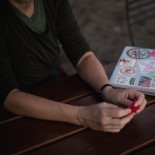A Review and Sort-of Review of “Duets for Abdelrazik”
The scary part about “finding” a review on Facebook of “Duets for Abdelrazik”(http://english.al-akhbar.com/content/duets-abdelrazik-art-political-action) some ten minutes after I’d popped the CD into my computer is how quickly the tiny little electronic trackers coming into my notebook found my decision to listen to this haunting music — probably not a good idea given my already-melancholic mood (sigh; no doubt the electronic stalkers know that too).
The wonderful part, though, is now I don’t have to write a review for my friend Stefan Christoff, whose vision and piano both so artfully weave their way through this musical-political project. Rebecca Whiting’s review says it all — or most of it:
“The melancholic tones of the album, at moments carried by thoughtful meanderings on the piano and at others punctuated by stark strikes, above all exude a sense of loss and longing. The pieces, which play like conversations between Christoff and the musicians he plays beside, are, he says, a reflection on the personal story and struggles of Abdelrazik, a case which ‘symbolizes the uncomfortable truth about the great injustices directed at the Arab and Muslim community in Canada post 9/11.’”The one thing she missed is the self-organized, collective, artisanal sensibility of its production, distribution, and even performance (having gone to the magical debut this summer, which not only enhanced the sensuality and power of the music but brought a packed house of political troublemakers, in a good way, together for a celebration and remembrance of things won, things in progress, things lost through struggle).
All speak to a political commitment as well — even if far subtler than Abdelrazik’s tragic story. The politics of radical street art, screen printing, and design along with voluntary associations, and so much more went into every CD and each composition on it. In a day and age when “DIY” music scenes are more frequently spaces to be seen/scene in than spaces in which to create our own worlds, de-politicized and commodified, a near-parody of what they were contesting in the first place, musicians and artists banding together on a CD like this — embedded within the larger context of racist geopolitical, and backgrounded this past year by the Quebec student strike and the participation of many on this “Duet” project in it via “general strike/dream” artistic street interventions, anticapitalist street art, and other ways to use culture as a tool in social revolt — don’t need words so much as their lived actions, their commitment to process and, in the case of standing up for Abdelrazik, principles. Sometimes things like CDs don’t need to shout “politics” to actually more loudly proclaim why culture and cultural creators — illustrators, designers, musicians, etc. — can be thoroughly adept at decrying the horrors of the status quo and holding up a different light, similar to the one beckoning us on the CD’s cover (shown here in a photo by Thien, with artwork by Nazik).
It’s a beautiful yet grief-filled listen, which is as it should be. We experience both in struggling for ever-elusive justice. Holding on to that “sense of loss and longing” might be just what we need to continually propel us toward resistance and yet know why, as well, we desire so much to rebel.
Hmm, maybe that was a tiny review of sorts.

